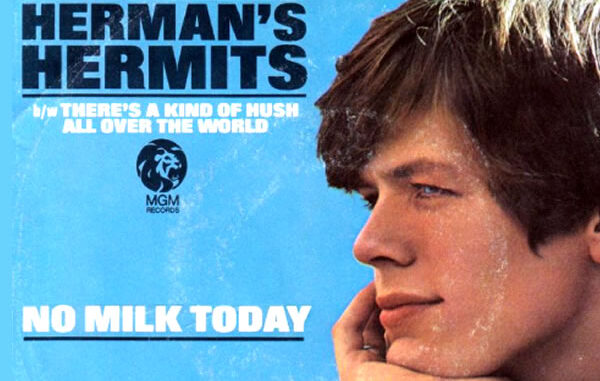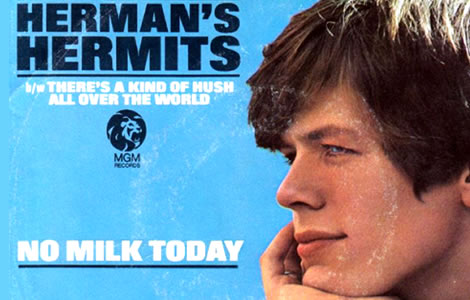
In 1966, Herman’s Hermits released “No Milk Today,” a song that quickly became a significant hit in the UK and resonated with audiences worldwide.

The track, written by the talented Graham Gouldman, was a standout for its poignant lyrics and melancholic melody, capturing a sense of longing and heartbreak that transcended generations.
Herman’s Hermits: Pop Sensations of the British Invasion
Herman’s Hermits were at the forefront of the British Invasion, a cultural phenomenon where British rock and pop music became wildly popular in the United States and around the world.
Led by the charismatic Peter Noone, the band gained a massive following with their catchy tunes and boy-next-door charm. Their sound, characterised by clean vocals and infectious melodies, made them one of the most successful groups of the 1960s.
Graham Gouldman’s Masterful Songwriting Shines in Melancholic Hit
Graham Gouldman, known for his songwriting prowess, crafted “No Milk Today” with a blend of simplicity and depth. The song tells the story of a breakup through the eyes of a milkman who finds that there is “no milk today” at a particular house, symbolising the end of a relationship.
Gouldman’s ability to convey such profound emotion in a seemingly mundane scenario showcases his genius as a songwriter.
Peter Noone’s Vocals Bring Emotional Depth to Iconic Song
Peter Noone’s vocal delivery in “No Milk Today” added a layer of emotional depth that resonated with listeners. His clear, expressive voice captured the sadness and nostalgia embedded in the lyrics, making the song not just a hit but a timeless piece of music.
Noone’s interpretation of Gouldman’s lyrics brought the story to life, turning it into a hauntingly beautiful track that continues to affect listeners even today.
1966: A Year of Cultural Shifts and Musical Milestones
The release of “No Milk Today” came during a year of significant cultural and historical events.
In the UK, 1966 was marked by a momentous occasion when England’s national football team won the FIFA World Cup on July 30, defeating West Germany 4-2 in an electrifying final at Wembley Stadium.
This victory was a source of immense national pride and celebration.
Heartbreak and Nostalgia: The Timeless Appeal of “No Milk Today”
The song’s enduring appeal lies in its universal theme of heartbreak and nostalgia.
The image of a milk bottle left outside a door, with the note “no milk today,” speaks to the abrupt and sometimes silent end of relationships.
It’s a simple yet powerful metaphor that listeners from different backgrounds and eras can relate to, which is why the song continues to haunt and resonate through generations.
“No Milk Today” Symbolises Changing Relationships in the 60s
The 1960s was a time of significant social change, and “No Milk Today” reflected the evolving nature of personal relationships during this period.
As traditional norms were questioned and new ideas about love and partnership emerged, the song’s theme of loss and reflection resonated deeply with a society in transition.
From the UK to the US: The Global Success of Herman’s Hermits
Herman’s Hermits enjoyed immense success not only in the UK but also internationally.
“No Milk Today” was a hit in several countries, demonstrating the band’s global appeal. In the United States, the British Invasion had already paved the way for UK bands to dominate the charts, and Herman’s Hermits were at the forefront of this movement.
Their music bridged cultural gaps, bringing British pop to the ears of American teenagers and beyond.
1966: The Year “No Milk Today” Resonated Across Generations
The year 1966 was a period of upheaval and transformation.
In the United States, Dr. Martin Luther King Jr. continued his civil rights activism, leading marches and advocating for equality and justice.
King’s efforts in Chicago during the Chicago Freedom Movement highlighted segregation and housing discrimination issues, bringing national attention to the struggle for civil rights.
Legacy of Herman’s Hermits: A Band That Defined an Era
Herman’s Hermits left an indelible mark on the music scene of the 1960s. Their ability to produce commercially successful and emotionally resonant hits set them apart from many of their contemporaries.
“No Milk Today” remains one of their most beloved songs, a testament to the band’s enduring legacy.
England’s World Cup Victory: A Nation Rejoices
The same year “No Milk Today” climbed the charts, England celebrated its historic World Cup victory. On July 30, 1966, the English football team triumphed over West Germany in a 4-2 match, a win that brought immense joy and pride to the nation.
This victory was a sporting achievement and a cultural moment that united the country in celebration.
In the US, 1966 was marked by ongoing civil rights struggles. Dr. Martin Luther King Jr. led significant efforts to combat racial injustice.
His involvement in the Chicago Freedom Movement aimed to address the deeply entrenched segregation and economic disparities faced by African Americans.
King’s activism during this period was crucial in the broader fight for equality and social justice.
Cultural and Social Impact of “No Milk Today”
The release and success of “No Milk Today” can be seen as a reflection of the broader cultural and social dynamics of the 1960s.
The song’s themes of change, loss, and reflection mirrored the experiences of many during this transformative decade. As society grappled with shifting norms and values, music like “No Milk Today” provided a poignant soundtrack to these changes.
No Milk Today, the Sound of a Lifetime on Capitol fm
“No Milk Today” by Herman’s Hermits is more than just a song; it is a reflection of the 1960s, capturing the emotional and social changes of the time.
Its success and lasting appeal are a testament to the band’s talent and the song’s timeless message.
As we look back on the events of 1966, “No Milk Today” stands out as a poignant reminder of a year filled with cultural milestones and historical significance.
From England’s World Cup triumph to Dr. Martin Luther King Jr.’s civil rights efforts, the song remains a hauntingly beautiful piece that continues to resonate across generations.
